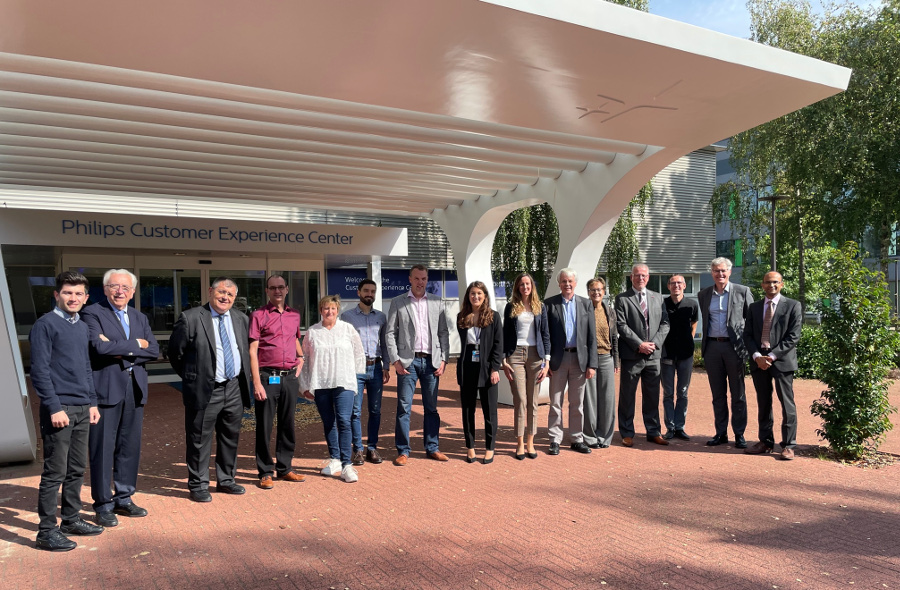
BigMedilytics drives large-scale integration of big data and artificial intelligence techniques in healthcare
The BigMedilytics project presented the results and lessons learned from the application of big data and artificial intelligence techniques in different hospitals in Europe during the virtual event “Big Data & AI: Actionable Insights Transforming European Healthcare“, organised by the INCLIVA and Philips on the 13th and 14th of September.
Around 400 healthcare professionals, data scientists, medical technology companies, insurers, research institutes, and universities from all over Europe joined this multidisciplinary event, which also included the participation of the European Commission through the Vice-Chair of the Mission Board Cancer, Christine Chomienne, and Licínio Kustra Mano, Strategic Advisor for EU Cross-Border eHealth Services.
The panel of invited speakers was completed by Jeroen Tas, a member of the Board of Directors of GAIA-X and former Chief Strategy & Innovation Officer at Royal Philips, Dr. Michael von Wagner, Chief Information Officer & Senior Physician at the University Hospital Frankfurt, and Thomas Zerdick, Head of Unit “Technology and Privacy” at the European Data Protection Supervisor.
Over the past three and a half years, the BigMedilytics project, comprising a consortium of 35 partners from 12 countries, has explored how big data solutions can be scaled in the healthcare sector across Europe with the ultimate goal of improving patient outcomes and increasing productivity in the health sector. To this end, teams composed of professionals from various fields have launched 12 pilot projects in different hospitals across Europe, grouped into the three areas with the greatest socio-health impact: population health and chronic diseases, oncology, and industrialisation of healthcare.
The major innovation of BigMedilytics has been the holistic approach to the different pilots, covering the key aspects of technology, regulation, standards, models of care, as well as clinical aspects. All the resulting learnings have been brought together in a blueprint, an interactive tool to provide knowledge to key stakeholders in the healthcare sector with the aim of driving the adoption of big data technologies across Europe. The implementation of these solutions will make it possible to establish more effective processes in diagnosis and treatment, as well as in-hospital workflows that will benefit both patient health and the sustainability of the European healthcare system.
Comorbidities, heart failure, kidney disease, diabetes, asthma, and chronic obstructive pulmonary disease have been studied in the field of population health and chronic diseases. The results of the five pilots have shown that it is possible to safely collaborate with large healthcare datasets, combined with cutting-edge technologies such as artificial intelligence, the internet of things, or remote patient monitoring, to carry out personalised patient care on a large scale.
The #kidneydisease pilot has developed telemedicine care for patients after kidney transplantation. In addition, prediction models were set up to make statements about the probability of graft loss, infections, and rejections.
? Prof. Dr. Klemens Budde and Dr. Roland Roller pic.twitter.com/twatNPaODa
— BigMedilytics (@BigMedilytics) September 13, 2021
In the area of oncology, three pilots have been implemented on prostate, breast, and lung cancer. The three pilots cover diverse areas of innovation ranging from the digitalisation of the care flow around decision-making and treatment execution to the implementation of risk assessment models and treatment outcomes based on big data. The artificial intelligence algorithms implemented help the multidisciplinary clinical team to decide the most optimal care in terms of treatment benefit versus treatment side effects.
María Torrente and @MEVidalSerodio presenting Lung Cancer Pilot at “Big Data & AI: Actionable Insights Transforming European Healthcare”. @BigMedilytics,@NCSR_Demokritos, @ernesmena, @alejandrorodgnz,@l3s_luh, @TIBHannover,@atc_gr, @TIB_SDM, @CTBUPM #BigMedilyticsfinalevent pic.twitter.com/Rmj8vtR4OD
— TIB SDM (@TIB_SDM) September 13, 2021
The project has also focused on hospital operational aspects to improve workflow optimisation. BigMedilytics has shown that real-time location information can generate previously unobservable knowledge to reduce operating costs through efficient asset management and to mitigate care bottlenecks that delay the implementation of treatments in diseases where care time is key, such as sepsis or stroke.
The #Radiology workflows pilot optimizes radiology workflows by introducing an image search tool for use by radiologists to speed up the interpretation of images.
? Prof. Helmut Prosch (@MedUni_Wien) and Prof. Allan Hanbury (@contextflow_rad).#BigMedilyticsfinalevent #H2020 pic.twitter.com/abu5zX4k9X
— BigMedilytics (@BigMedilytics) September 14, 2021
In this third area, it has also been demonstrated that it is possible to improve workflows in radiology departments thanks to the introduction of innovative image search tools based on artificial intelligence capable of drastically reducing the time spent searching for relevant information during image interpretation and, in turn, improving the quality of reports.
During the event was also possible to interact with the pilots and blueprint representatives and watch demos, interviews and other materials through the booths in the virtual exhibition.
All the contents are available on the platform of the event until the 17th of October. Click here to access the platform. Simply log in with your email address and your chosen password.
The recordings of the presentations are available on the project’s YouTube channel. You can also access the posters presented during the event here.

